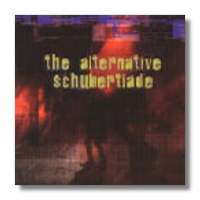
The Internet's Premier Classical Music Source
Related Links
- Latest Reviews
- More Reviews
-
By Composer
-
Collections
DVD & Blu-ray
Books
Concert Reviews
Articles/Interviews
Software
Audio
Search Amazon
Recommended Links
Site News
 CD Review
CD Review
The Alternative Schubertiade

Homages, deconstructions, and reinventions
- Nick Didkovsky: Impromptu in E Flat Major after Schubert
- Annie Gosfield: Cram Jin Qotient
- Phil Kline: Franz in the Underworld
- Anita D. Perry: Fremd Zieh' Ich Wieder Aus
- Roger Kleier: Sighted Sub, Sank Same
- Kitty Brazelton: Fishy Wishy
- David First: Thought You Said Sherbert
- Gordon Minette: Das Morgenholz
- D J Firehorse: Shoebird
- Anita D. Perry: URWhatU8
Various performers
CRI CD 809 DDD 61:25
Music, after all, is only data, and Schubert's data are a great deal better than those of some other composers. Phil Kline, one of the bright lights in New York City's Downtown music scene, recognized this, and it was his idea to pay tribute to the Austrian composer in the bicentennial year of his birth. He and CRI (Composers Recordings, Inc.) called the event "The Alternative Schubertiade," the name in itself a tribute to the good old days when Franz and his friends entertained each other with music. Kline gathered his friends and colleagues from various backgrounds together and asked them to devise music whose departure point was, in one way or another, Schubertian.
This was a live event; most of the selections on this CD were recorded later on, however, in more controlled conditions. (The exception is Roger Kleier's Sighted Sub, Sank Same, a "large wall of sound in C Major" based on Schubert's Ninth Symphony, and performed on an electric guitar with a digital looping device. It was recorded live, and the bewildered crackling of Kleier's borrowed amp adds to the performance's evocative qualities.) Composer Nick Didkovsky, for example, treated Schubert's E Flat Major Impromptu quite literally as statistical data. Pianist Evelyne Luest recorded the original work to hard disk, then Didkovsky used software to "morph" between Luest's statistics and distorted statistics of his own. Schubert's music remains recognizable, but it sounds as if it is being performed by a bad-tempered player piano with an attention-deficit disorder to boot. Didkovsky says the work was arranged by "Minsky Popolov," which I assume is a joke! In Thought you said Sherbet, David First puts the opening measures of the song Gretchen am Spinnrade under the microscope, adds some drones and electric guitar colorations, and produces harmonic interferences that make "the listener's head spin like Gretchen's wheel." (Are you getting the idea?)
Another approach is to treat not a performance but a recording of Schubert's music as the data. In Cram Jin Quotient (an anagram of "Quintet in C Major"!), Anne Gosfield takes a recording of Schubert's Quintet and deconstructs each movement with a sampling keyboard. Delicious moments of Schubertian harmony linger on and on, and on, and Gosfield adds a patina of noise, as if one were listening to a 78-rpm record. Again, the original music remains identifiable, but it is nearly immobilized in a block of digital gelatin. With a computer and synthesizers, Phil Kline himself deconstructed the menacing trill in Schubert's B Flat Major Piano Sonata in Franz in the Underworld. "The work is scored for six player pianos, strings, brass, and drum machines, all realized on the computer," Kline writes. D.J. Firehorse "simply" mixed a sampling of Schubert discs together in dance club tradition, and added some electronically processed bird songs: Shoebird was the result.
Other composers took even more bizarre approaches. Jon Bepler condensed Die Winterreise into seven minutes of pathic grunts and announcements. Kitty Brazelton, apparently miffed that Schubert had denied vocalists everything but the melody in the fourth movement of his "Trout" Quintet, arranged the same for three voices, piano, and vibes. This is easily the most amusing selection on the CD; the vocalists negotiate figures in the accompaniment as if they were imitating the Swingle Singers, and they do so to added lyrics such as "fishy my love." In contrast, Das Morgenholz, a four-hand piano work by Gordon Minette, is almost tender. The disc ends with what I think is one of its strongest works: URWhatU8 by John Myers. This is realization, and, in a sense, a completion of Schubert's "Unfinished" Symphony. It is scored for wall-like electric guitars, and Myers calls it "a possible projection of Schubert's own longing." It's certainly melancholy and powerful. Myers writes that the process of writing URWhatU8 converted him to being a Schubert fan. It might convert you to being a fan of the Downtown scene.
The performances are definitive, I assume, and the annotations, by Kline and each of the composers, are fascinating. On the basis of The Alternative Schubertiade, the avant garde scene in New York City is alive and well, and so is Schubert's reputation. I wonder what he would have thought about all this.
Copyright © 2000, Raymond Tuttle



















